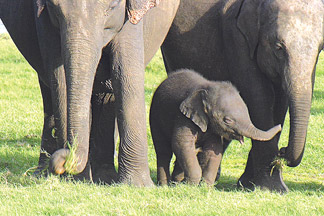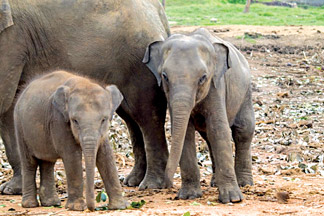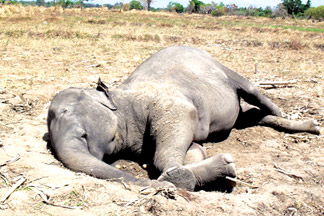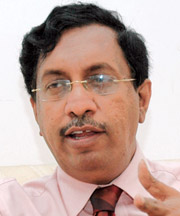Jumbo issues
Amalshan GUNERATHNE

Roughly around 125 to 150 elephants and 60 people die every year |

Let’s stick together, so they can’t hurt us |
 |
|
Who will
hear their cries for help? |
It is tragic that the grasslands which once was a safe haven, has now
turned into a deadly mine-field filled with peril? The very same meadows
that once used to bless them with food and comfort are now filled with
hazards. A sense of gloom and death lurks everywhere. No longer can they
meander aimlessly in the rich wilderness. Heavy with suspicion, fear and
doubt, they walk on.
Such are the problems elephants of Sri Lanka face today. At the very
beginning, the invaders were nothing but random trespassers. There were
times where both used to get along in harmony. But as time moved on,
more trespassers came to invade their privacy. Even when the elephants’
privacy was compromised, they did not mind. It is when the raiders began
to wreak havoc on their lands and take away what is rightfully theirs,
they became enraged. They were furious to see their green homes being
torn down by sophisticated human machinery. They decided to fight back
and stand up for their rights, their lands, their homes and their loved
ones. Needless to say that the conflict between elephants and humans has
reached its climax and the time is ripe to intervene and prevent further
mayhem.
Can we blame them for standing up for what is rightfully theirs? Can
we blame them for avenging the injustices? Should humans be forgiven for
taking away elephant habitats to satisfy their mercenary desires? Some
would say no. Humans, those who take great pride in their intellectual
capacity and heightened sensitivity, those who claim that they have
reached the pinnacle of civilization have done nothing but invade their
privacy and create chaos at the expense of both animal and human life.
True, sometimes the so-called intellectuals get together at luxurious
board meetings to discuss ‘elephant issues’. But whether those proposals
are implemented or not remains to be answered. Many proposals were made
to prevent the conflict to no avail. Despite endless boardroom
discussions, suggestions and proposals about preventing the conflict, it
still ravages on.
 |
 |
Environment Minister
Anura Priyadarshana Yapa |
University of Colombo Senior Lecturer of Zoology Dr Devaka
Weerakon |
Roughly around 125 to 150 elephants and 60 people die every year due
to the conflict. “The conflict is escalating, the number of incidents
are increasing every year,” says University of Colombo Senior Lecturer
of Zoology Dr Devaka Weerakon. He explained that proposals and
suggestions to counter the conflict have always been in existence. “But
the real problem is that nobody is bothering to implement those
proposals. The whole implementation process is retarded. It is a very
frustrating dilemma.”
The grand development schemes under way may pose an even bigger
threat to these gentle giants. The forests have been replaced by layers
of vast concrete citadels. “There is no question that some of the recent
development projects have had an immediate effect on their natural
habitat. I am not saying that development is ‘bad’ and I am not against
any development schemes, but development has to be sustainable,” said Dr
Devaka Weerakon. He said that this requires solid planning. “The
government or the development agency that is entrusted with the project
has to make a real commitment and make sure that they carry out the
conservation proposals which they promise to uphold.”
However when questioned on the dilemma, the Environment Minister,
Anura Priyadarshana Yapa said that he does not agree that the
development schemes have such a great impact on the conflict. “In some
countries people build towns within forests. Human elephant conflict
cannot be solved by demarcating them boundaries to keep elephants on one
side and men in another.” He explained that people have to learn to
understand the ways of these sophisticated creatures. Action must be
taken to make villagers understand their behaviour and create harmony.
“In the past people and elephants coexisted. The conflict can only be
settled by recreating this environment.”
But, creating such a peaceful co-existence is still a distant dream.
Men have come up with more twisted, warped and distorted ways of killing
these poor creatures. Elephants can no longer even feel the taste of
their favourite melon or cucumber, without having to worry that it will
blow up in their mouths. Now melons and cucumbers come with explosives
inside, colloquially referred to as Hakkapatas. As they try to munch
them, the explosives inside trigger and burst within their jaws,
resulting in a long and excruciating death resulted by starvation.
“Hakkpatas is dangerous. Those who use it should be arrested and laws
should be enforced to make it a nonbailable offense,” said the Minister.
Still, no matter how strict the rules are, the crimes do not stop.
The hunting still goes on. “The rules are always there, but they just
don’t put them into practice. It is how you implement those laws and
regulations that create a law abiding society,” said Dr Devaka Weerakon.
In a sense, it is tragic that people do not realize the real value of
this fascinating species. Elephants are without a doubt a tourist
magnet. However, if the parks and sanctuaries are not properly managed,
things will only aggravate. Speaking of the status of the contemporary
Sri Lankan parks, Dr Weerakon says, “In most parks, tourist vehicles are
not properly managed. Sometimes safari drivers drive their vehicles
straight up to elephants and act in a very irresponsible manner. It
irritates them.” He reiterated the importance of developing a mechanism
to monitor such reckless behaviour. “In other countries Safari drivers
are not permitted to act in such an irresponsible manner.”
Controversies regarding human-elephant conflict are endless. Among
the latest to burst in to surface is the plans of the Pinnawala
Orphanage to give away elephants to temples and other institutions. Many
eye-brows were raised as to whether the elephants will get the same care
and affection once they are taken by the new owners. When quarried on
the matter, the Environment Minister said, “The whole controversy is
absurd. There is nothing wrong in donating elephants to people who can
care for them. We cannot ask Pinnawala to do everything. There are lots
of elephant lovers out there who are willing to look after them. I don’t
know why NGOs are crying over this matter.”
Will the cries of anguish and pain of the elephants be ever heard by
the relevant authorities? Their numbers are thinning, yet their
rebellion ravages on. |



